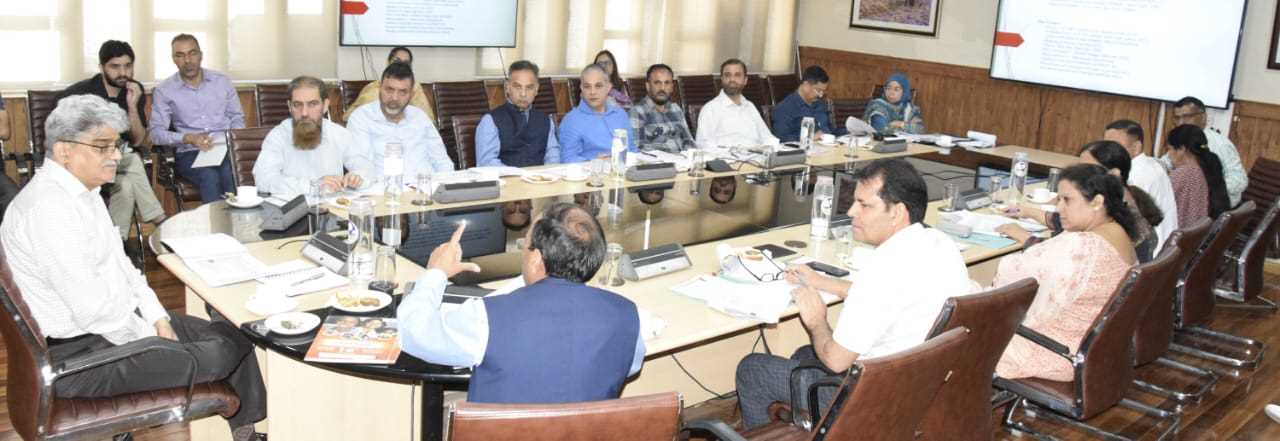
Chief Secretary Atal Dulloo chaired a comprehensive review meeting today to assess the implementation of welfare schemes targeting marginalized and vulnerable communities across Jammu and Kashmir.
The meeting was attended by Principal Secretary, Social Welfare Department (SWD), Anil Kumar Singh; Secretary SWD; Mission Directors of ICDS, ICPS, and Mission Vatsalya; Chairperson, Juvenile Justice Board; Directors Social Welfare (Jammu/Kashmir), DSWOs, and other senior officials.
Emphasizing the importance of infrastructure at the grassroots level, the Chief Secretary directed officials to upgrade all Anganwadi Centres (AWCs) with basic facilities such as electricity, drinking water, and toilets. Priority is to be given to centres housed in government-owned buildings through inter-departmental convergence, particularly with the Rural Development Department. He also advised shifting centres currently operating from private premises that lack essential infrastructure.
Dulloo stressed outcome-based monitoring of nutrition interventions under Mission Poshan, particularly those focused on children, adolescent girls, and lactating mothers. He urged Programme Officers and DSWOs to conduct regular field visits, ensuring that policy decisions are rooted in ground realities.
Looking ahead, the Chief Secretary proposed the development of Composite Homes in each district—a shared care model for orphaned children, elderly citizens, and destitute women, aimed at fostering community living and reducing social isolation.
Principal Secretary Anil Kumar Singh informed that SWD is currently running 37 centrally sponsored schemes and 9 UT-specific schemes with a budget outlay of ₹4,361 crore for 2025–26. He said the UT has around 28,000 AWCs, serving close to 9 lakh beneficiaries.
The meeting reviewed flagship programmes such as:
Mission Poshan (7 schemes): Targeting nutritional enhancement for children, adolescent girls, and mothers.
Mission Shakti (6 schemes): Focused on women's safety, empowerment, and protection.
Mission Vatsalya (7 schemes): Providing institutional care for vulnerable groups.
Other major schemes reviewed included SMILE, AVYAY (elderly welfare), SAPSrC, PM-AJAY (SC welfare), PM-YASASVI Scholarships, NAPDDR (drug de-addiction), NSAP, and scholarships for SC, OBC, and minority students. UT initiatives like ISSS, Ladli Beti, Marriage Assistance, SC Scholarships, Mobility Support for specially-abled persons, and aid to militancy-affected families were also discussed.
The department has submitted consolidated proposals totaling ₹1,088.75 crore for the upcoming fiscal, of which major schemes like ICDS/Mission Poshan (₹759.67 Cr), Mission Shakti (₹40.79 Cr), and Mission Vatsalya (₹126.54 Cr) have received approval. Proposals for PMMVY (₹64.39 Cr) and BBBP (₹6.20 Cr) have also been cleared, while others are pending approval.
The Chief Secretary directed timely execution and high financial progress—targeting 90% utilization—to ensure effective service delivery at the grassroots.
Chief Secretary Atal Dulloo chaired a comprehensive review meeting today to assess the implementation of welfare schemes targeting marginalized and vulnerable communities across Jammu and Kashmir.
The meeting was attended by Principal Secretary, Social Welfare Department (SWD), Anil Kumar Singh; Secretary SWD; Mission Directors of ICDS, ICPS, and Mission Vatsalya; Chairperson, Juvenile Justice Board; Directors Social Welfare (Jammu/Kashmir), DSWOs, and other senior officials.
Emphasizing the importance of infrastructure at the grassroots level, the Chief Secretary directed officials to upgrade all Anganwadi Centres (AWCs) with basic facilities such as electricity, drinking water, and toilets. Priority is to be given to centres housed in government-owned buildings through inter-departmental convergence, particularly with the Rural Development Department. He also advised shifting centres currently operating from private premises that lack essential infrastructure.
Dulloo stressed outcome-based monitoring of nutrition interventions under Mission Poshan, particularly those focused on children, adolescent girls, and lactating mothers. He urged Programme Officers and DSWOs to conduct regular field visits, ensuring that policy decisions are rooted in ground realities.
Looking ahead, the Chief Secretary proposed the development of Composite Homes in each district—a shared care model for orphaned children, elderly citizens, and destitute women, aimed at fostering community living and reducing social isolation.
Principal Secretary Anil Kumar Singh informed that SWD is currently running 37 centrally sponsored schemes and 9 UT-specific schemes with a budget outlay of ₹4,361 crore for 2025–26. He said the UT has around 28,000 AWCs, serving close to 9 lakh beneficiaries.
The meeting reviewed flagship programmes such as:
Mission Poshan (7 schemes): Targeting nutritional enhancement for children, adolescent girls, and mothers.
Mission Shakti (6 schemes): Focused on women's safety, empowerment, and protection.
Mission Vatsalya (7 schemes): Providing institutional care for vulnerable groups.
Other major schemes reviewed included SMILE, AVYAY (elderly welfare), SAPSrC, PM-AJAY (SC welfare), PM-YASASVI Scholarships, NAPDDR (drug de-addiction), NSAP, and scholarships for SC, OBC, and minority students. UT initiatives like ISSS, Ladli Beti, Marriage Assistance, SC Scholarships, Mobility Support for specially-abled persons, and aid to militancy-affected families were also discussed.
The department has submitted consolidated proposals totaling ₹1,088.75 crore for the upcoming fiscal, of which major schemes like ICDS/Mission Poshan (₹759.67 Cr), Mission Shakti (₹40.79 Cr), and Mission Vatsalya (₹126.54 Cr) have received approval. Proposals for PMMVY (₹64.39 Cr) and BBBP (₹6.20 Cr) have also been cleared, while others are pending approval.
The Chief Secretary directed timely execution and high financial progress—targeting 90% utilization—to ensure effective service delivery at the grassroots.
© Copyright 2023 brighterkashmir.com All Rights Reserved. Quantum Technologies